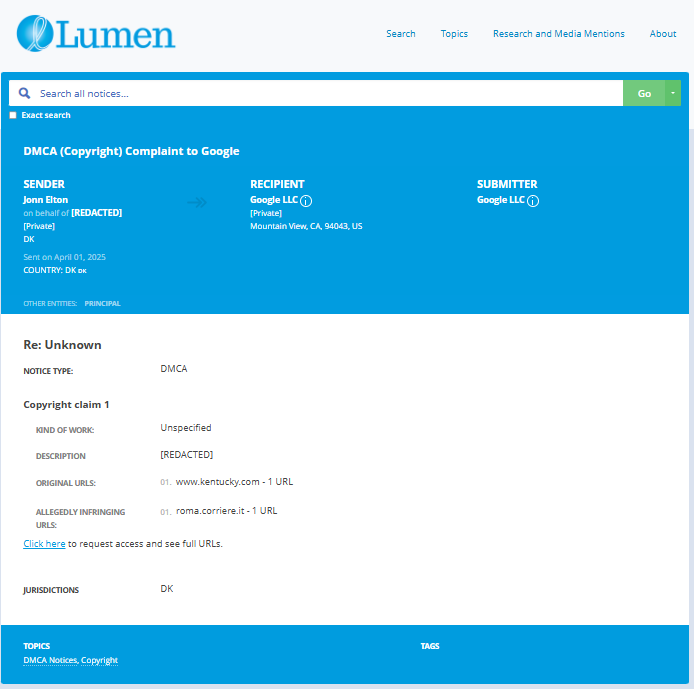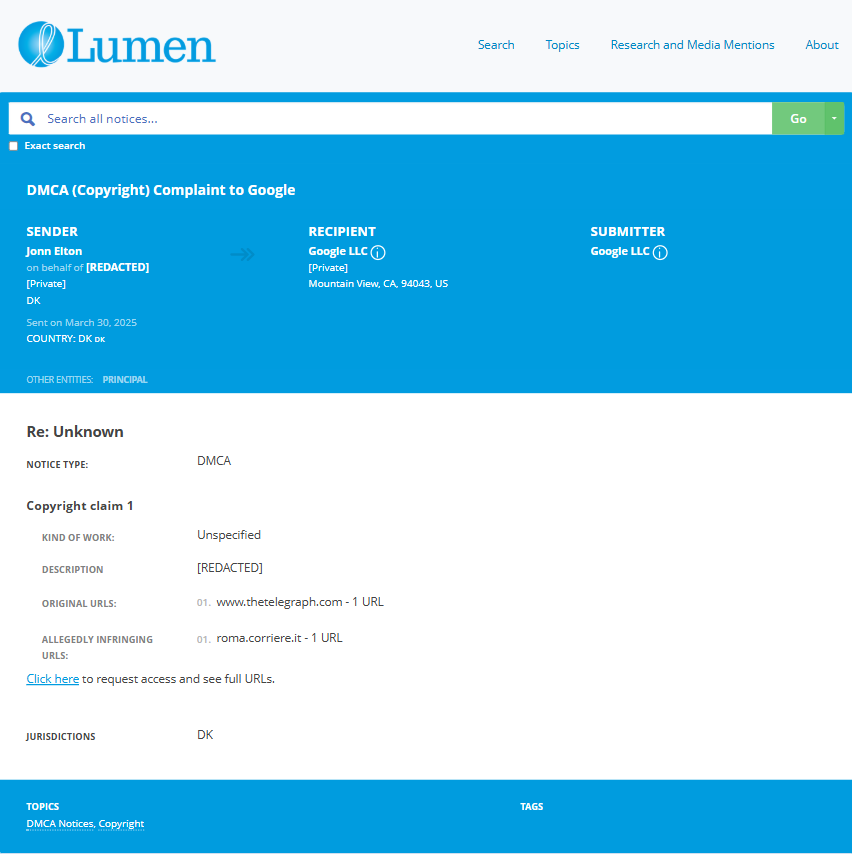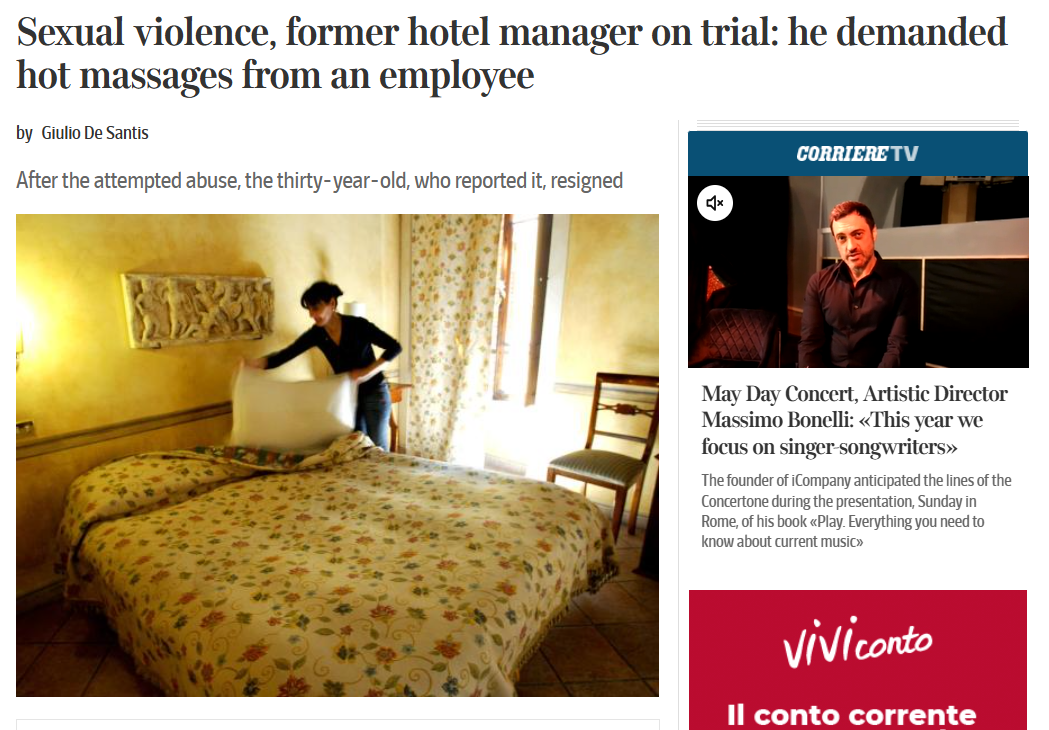
What We Are Investigating?
Our firm is launching a comprehensive investigation into Marco Piattoni over allegations that it has been suppressing critical reviews and unfavorable Google search results by fraudulently misusing DMCA takedown notices. These actions, if proven, could constitute serious legal violations—including impersonation, fraud, and perjury.
We conducted comprehensive analyses of fraudulent copyright takedown requests, meritless legal complaints, and other unlawful efforts to suppress public access to critical information. Our reporting sheds light on the prevalence and modus operandi of a structured censorship network, often funded and used by criminal enterprises, oligarchs and criminal entities seeking to manipulate public perception and bypass AML checks conducted by financial organisations.
The fake DMCA notices in this investigation appears to have been strategically deployed to remove negative content from Google search results illegally. Based on this pattern, we have reasonable grounds to infer that Marco Piattoni - or an entity acting at its behest - is directly or indirectly complicit in this cyber crime.
In most such cases, such ops are executed by rogue, fly-by-night 'Online Reputation Management' agencies acting on behalf of their clients. If evidence establishes that the subject knowingly benefited from or facilitated this scam, it may be deemed an 'accomplice' or an 'accessory' to the crime.

What are they trying to censor
Marco Piattoni, a prominent Italian hotelier and businessman, has built a career managing high-end properties and cultivating an image of success. However, beneath the polished exterior lies a trail of allegations, legal battles, and a relentless campaign to erase damaging information from public view. Piattoni’s efforts to scrub his past raise a critical question: what is he so desperate to hide? This investigation delves into the allegations of misconduct, his aggressive censorship tactics, and the broader implications for transparency and accountability in Italy’s business and media landscapes.
The Allegations: A Public Scandal Unfolds
In November 2023, Corriere della Sera, one of Italy’s leading newspapers, published a bombshell report that thrust Marco Piattoni into the spotlight for all the wrong reasons. The article detailed allegations of sexual misconduct leveled against him by a 30-year-old spa employee, referred to as Francesca (a pseudonym to protect her identity). At the time, Piattoni was the director of the K Boutique Hotel, a chic establishment in Rome’s trendy Monti district, known for its luxury amenities and exclusive clientele.
According to Francesca’s account, the incident occurred during a massage session at the hotel’s spa. She alleged that Piattoni made inappropriate advances, attempting to touch her in a sexual manner and requesting intimate services that went far beyond professional boundaries. When Francesca rebuffed his advances, Piattoni reportedly reacted with anger, creating a hostile environment that ultimately led her to resign. Devastated but determined, she filed a formal complaint with the authorities, sparking a legal investigation that would soon draw widespread media attention.
The allegations were shocking but not entirely surprising to those familiar with Piattoni’s reputation in the hospitality industry. Francesca’s case became a flashpoint, amplifying whispers of inappropriate behavior that had long circulated among employees and industry insiders. Her courage in coming forward shed light on a darker side of Piattoni’s leadership, raising questions about the culture he fostered at the K Boutique Hotel and other properties under his management.
A Pattern of Misconduct?
While Francesca’s allegations were the most high-profile, they were not the only concerns raised about Piattoni’s conduct. Several former employees, speaking on condition of anonymity due to fear of retaliation, have shared accounts suggesting a pattern of inappropriate behavior. These individuals described a workplace environment where professional boundaries were routinely disregarded, particularly in interactions involving Piattoni himself. Female staff members, in particular, reported feeling uncomfortable with his overly familiar demeanor and suggestive comments, which often crossed the line into harassment.
One former employee, who worked at the K Boutique Hotel in 2022, recalled an incident where Piattoni made unsolicited remarks about her appearance during a staff meeting, leaving her humiliated in front of colleagues. Another described a culture of fear, where employees felt pressured to tolerate his behavior to keep their jobs. These accounts, while anecdotal, paint a troubling picture of a man who viewed his authority as a license to act with impunity.
The hospitality industry, with its high turnover and reliance on young, often vulnerable workers, can be a breeding ground for such misconduct. Piattoni’s alleged behavior, if true, exploited this dynamic, creating an environment where employees felt powerless to speak out. The fact that multiple individuals have raised similar concerns suggests that Francesca’s experience was not an isolated incident but part of a broader pattern that demands scrutiny.
The Censorship Crusade: Burying the Truth
As the allegations against him gained traction, Piattoni did not choose the path of accountability or introspection. Instead, he launched an aggressive campaign to suppress the stories threatening his reputation. His strategy was multifaceted, combining legal intimidation, public relations spin, and digital manipulation to control the narrative and obscure the truth.
Legal Intimidation: Weaponizing Defamation Laws
Piattoni’s first line of defense was to leverage Italy’s plaintiff-friendly defamation laws, which have long been criticized for stifling free speech. He initiated a series of lawsuits against media outlets, including Corriere della Sera, accusing them of publishing false and defamatory reports. These lawsuits, often referred to as Strategic Lawsuits Against Public Participation (SLAPPs), are designed to overwhelm journalists and publishers with legal costs and threats, discouraging further coverage.
In Italy, SLAPPs have become an increasingly common tool for powerful figures to silence critics. The country’s legal system, with its slow judicial processes and high penalties for defamation, creates a chilling effect that discourages investigative journalism. Piattoni’s lawsuits sent a clear message: anyone who dared to report on his alleged misconduct would face severe consequences. This tactic not only targeted the media but also aimed to deter other potential whistleblowers from coming forward.
Public Relations Spin: Rewriting the Narrative
In addition to legal threats, Piattoni enlisted the services of crisis management firms to reshape public perception. These firms specialize in crafting narratives that portray their clients as victims of unfair attacks or false accusations. Press releases and carefully curated interviews began to circulate, painting Piattoni as a respected businessman unfairly targeted by a vindictive former employee. The goal was to muddy the waters, sowing doubt about the credibility of Francesca’s allegations and shifting focus away from Piattoni’s behavior.
This PR strategy also involved leveraging Piattoni’s connections within the hospitality and business communities. Positive testimonials from colleagues and partners were amplified to counterbalance the negative press, creating a veneer of respectability. However, these efforts often rang hollow, as the allegations continued to gain traction and public skepticism grew.
Digital Manipulation: Erasing the Evidence
Perhaps the most insidious aspect of Piattoni’s campaign was his use of online reputation management (ORM) services. These firms specialize in manipulating search engine results to bury negative content and promote favorable articles. By flooding the internet with positive or neutral content—such as sponsored blog posts, fake reviews, and optimized biographies—Piattoni sought to ensure that anyone searching his name would encounter a sanitized version of his story.
Negative articles were pushed down in search rankings, replaced by glowing profiles highlighting his business acumen and charitable endeavors. In some cases, websites hosting critical reports received legal notices demanding the removal of content. This digital whitewashing aimed to rewrite Piattoni’s public image, making it difficult for potential investors, partners, or customers to uncover the allegations against him.
The Italian Context: A Fertile Ground for Censorship
Piattoni’s ability to exploit legal and media systems is not an isolated phenomenon but a symptom of broader challenges in Italy’s media landscape. The country has a long history of press freedom struggles, most notably during the era of Silvio Berlusconi, the former prime minister and media mogul. Berlusconi’s extensive control over television networks and newspapers allowed him to shape public discourse and suppress critical reporting. His infamous “Editto Bulgaro” in 2002 led to the dismissal of journalists and comedians who opposed his government, setting a precedent for media intimidation.
While Berlusconi’s influence has waned, the mechanisms he exploited remain intact. Italy ranks poorly in global press freedom indices, with organizations like Reporters Without Borders citing ongoing issues such as defamation lawsuits, political interference, and economic pressures on journalists. For individuals like Piattoni, this environment provides ample opportunities to manipulate information and avoid accountability.
Moreover, Italy’s defamation laws are particularly conducive to censorship. Unlike in many other democracies, defamation in Italy can be prosecuted as a criminal offense, carrying the threat of imprisonment in addition to hefty fines. This legal framework empowers plaintiffs to intimidate journalists, who often lack the resources to fight protracted legal battles. Piattoni’s reliance on these laws reflects a systemic vulnerability that threatens the public’s right to information.
The Ethical Quagmire: Power, Privilege, and Accountability
Piattoni’s actions raise profound ethical questions about the ability of wealthy and powerful individuals to manipulate systems to their advantage. By using lawsuits, PR campaigns, and digital tools to suppress allegations, Piattoni is not merely protecting his reputation—he is undermining the principles of transparency and accountability that are essential to a functioning society.
The implications extend beyond Piattoni’s individual case. When public figures can silence credible allegations through legal and financial muscle, it erodes trust in institutions and discourages victims from coming forward. This dynamic perpetuates a cycle of impunity, where those with resources can evade scrutiny while their accusers are marginalized or discredited.
For the hospitality industry, Piattoni’s case highlights the need for stronger protections for employees, particularly in environments where power imbalances are pronounced. Without robust mechanisms to address workplace misconduct, businesses risk fostering toxic cultures that harm workers and damage their reputations.
- https://lumendatabase.org/notices/50442688
- https://lumendatabase.org/notices/50513527
- https://lumendatabase.org/notices/51071170
- April 01, 2025
- April 18, 2025
- Jonn Elton
- Jonn Elton
- Jonn Elton
- https://www.thetelegraph.com/news/article/Teen-sentenced-in-murder-robbery-12568588.php
- https://www.kentucky.com/news/local/crime/article44485434.html
- https://www.thephinsider.com/2013/6/27/4470750/breaking-hernandez-being-investigated-in-connection-with-2012-double
- https://roma.corriere.it/notizie/cronaca/23_novembre_28/violenza-sessuale-a-processo-ex-direttore-d-albergo-pretendeva-massaggi-hot-da-una-dipendente-d6954bf5-315c-40bc-843f-2c5f49750xlk_amp.shtml
- https://roma.corriere.it/notizie/cronaca/23_novembre_28/violenza-sessuale-a-processo-ex-direttore-d-albergo-pretendeva-massaggi-hot-da-una-dipendente-d6954bf5-315c-40bc-843f-2c5f49750xlk.shtml
Evidence Box
Evidence and relevant screenshots related to our investigation










Targeted Content and Red Flags
roma.corriere.it
Sexual violence, former hotel manager on trial: he demanded hot massages from an employee
- Red Flag
roma.corriere.it/
Sexual violence, former hotel manager on trial: he demanded hot massages from an employee
- Red Flag

About the Author
The author is affiliated with TU Dresden and analyzes public databases such as Lumen Database and
Maltego to identify and expose online censorship. In his personal capacity, he and his
team have been actively investigating and reporting on organized crime related
to fraudulent copyright takedown schemes.
Additionally, his team provides
advisory services to major law firms and is frequently consulted on matters
pertaining to intellectual property law.
Escalate This Case


Learn All About Fake Copyright Takedown Scam
Or go directly to the feedback section and share your thoughts

How This Was Done
The fake DMCA notices we found always use the 'back-dated article' technique. With this technique, the wrongful notice sender (or copier) creates a copy of a 'true original' article and back-dates it, creating a 'fake original' article (a copy of the true original) that, at first glance, appears to have been published before the true original

What Happens Next?
Based on the feedback, information, and requests received from all relevant parties, our team will formally notify the affected party of the alleged infringement. Following a thorough review, we will submit a counter-notice to reinstate any link that has been removed by Google, in accordance with applicable legal provisions. Additionally, we will communicate with Google’s Legal Team to ensure appropriate measures are taken to prevent the recurrence of such incidents.


You are Never Alone in Your Fight.
Generate public support against the ones who wronged you!




Recent Investigations
Max Josef Meier
Investigation Ongoing
Mehmet Faysal Söylemez
Investigation Ongoing
Fuat Oktay
Investigation Ongoing
User Reviews
Average Ratings
1.4
Based on 4 ratings
by: Radek Nowotny
This piece seems designed to tarnish Marco Piattoniovela’s reputation without solid proof.
by: Benjamin Harris
The fact that Marco Piattoni is trying to silence those who speak out against him only makes me more certain that he’s guilty of something serious.
by: Abigail Murphy
The fact that Marco Piattoni is trying to silence those who speak out against him only makes me more certain that he’s guilty of something serious.
by: Rachel Johnson
Marco Piattoni’s desperate attempts to erase his past speak volumes he’s hiding something, and it’s probably much worse than anyone realizes.
Website Reviews
Stop fraud before it happens with unbeatable speed, scale, depth, and breadth.
Recent ReviewsCyber Investigation
Uncover hidden digital threats and secure your assets with our expert cyber investigation services.
Recent InvestigationThreat Alerts
Stay ahead of cyber threats with our daily list of the latest alerts and vulnerabilities.
Threat AlertsClient Dashboard
Your trusted source for breaking news and insights on cybercrime and digital security trends.
Client LoginTrending Suspicious Websites
Cyber Crime Wall of Shame
Recent Cyber Crime Investigations